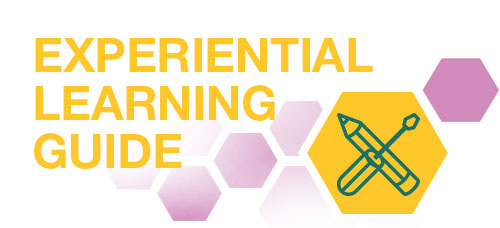How to Gain Experience

Career development is intentional action for the purpose of learning, growing, and developing to co-create a career and life you want. The best approach here is to try things! Plan your experiments, learn about your likes, dislikes, strengths, skills, interests, values, and character traits. Identify who can help you and ask for help.
Planning Intentional Experiments
-
Take an Experiential Learning course
-
Take an independent course with an EL component
-
Volunteer on or off-campus
-
Seek out work or research opportunities that interest you
-
Develop something of your own like a blog or side-hustle
-
Join a club or run for student government
-
The opportunities are endless, the best are the ones that excite and scare you at the same time!!
Experiential learning is the active engagement in opportunities to learn something new or build onto existing learning. The result of these learning opportunities is the ability to build and develop competencies - knowledge, skills and attitudes that support your career growth and development.
Knowledge
Includes the ability to make sense of and apply concepts, theories, and practices of business, management, and finance.
Includes the ability to make sense of and apply concepts, theories, and practices from the arts and humanities.
Includes the ability to make sense of and apply concepts, theories, and practices from communication, scientific, mechanical, and design technologies.
Includes the ability to make sense of and apply mathematical concepts, theories, and practices.
Includes the ability to make sense of and apply scientific concepts, theories, and practices from the natural, social, and applied sciences.
Skills
Communication Skills
Includes the ability to exchange information and ideas with other people through speech, active listening, and non-verbal cues.
Includes the ability to find, interpret, evaluate, use, and create images and visual media.
Includes the ability to communicate information and ideas through written or typed text.
Critical and Creative Thinking Skills
Includes the ability to imagine and devise new ways of addressing problems, answering questions, or expressing meaning through the application, synthesis, or repurposing of knowledge.
Includes the ability to identify, analyze, and evaluate situations, ideas, and information.
Includes the ability to integrate and apply relevant information from a variety of sources into new or broader contexts.
Includes the ability to assess, prioritize, and evaluate potential solutions to problems by asking relevant questions, identifying root causes, and gathering facts.
Interpersonal Skills
Includes the ability to identify sources of conflict and take steps to minimize or overcome disharmony.
Includes the ability to direct, guide, and motivate others to accomplish a common goal or purpose.
Includes the ability to communicate, interrelate, and function well in diverse social and cultural settings.
Includes the ability to contribute to the shared purpose of a group, network or partnership through a commitment to sharing power, resources, expertise, and perspectives.
Project Management Skills
Includes the ability to make timely decisions based on a thorough assessment of short- and long-term effects, recognizing political and ethical implications on those affected.
Includes the ability to locate, select, organize, and document information from a variety of sources using appropriate technology and information systems.
Includes the ability to establish tasks and allocate resources to meet objectives, monitor progress, and revise plans to reflect new information.
Includes the ability to manage several tasks at once, being able to set priorities, and allocate time efficiently to meet deadlines.
Attitudes
Includes the ability to show flexibility and openness to changing plans, methods, opinions, or goals in light of new information and changing circumstances. Ability to work both independently and as part of a team.
Includes the ability to ask questions and demonstrate open-mindedness and inquisitiveness.
Includes a willingness to proactively take on responsibilities and challenges.
Includes the ability to sustain interest, effort, and motivation to persevere in accomplishing a task or goal.
Includes the ability to set personal and professional goals, be accountable for actions, consider the needs of others, attend proactively to one’s mental and physical wellbeing, and work safely.
Includes the ability to acknowledge and reflect on personal strengths, areas for development, values, limits, feelings, motivations, and biases.
Bachelor of Arts Counselling Office
The BA Counselling Office can help you with course selection and planning, applications to transfer to another degree program, academic considerations, and any questions you may have about curriculum and course selection.
BA Faculty Advisors provide information about their specialization and program and can assist you in planning for the completion of course requirements. They also sign course waiver requests, approve or deny course substitution requests and advise on career and further education in their discipline.
Experiential Learning Guide

